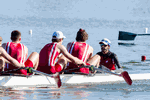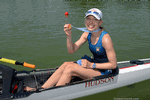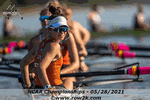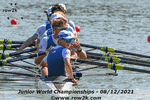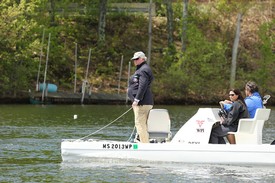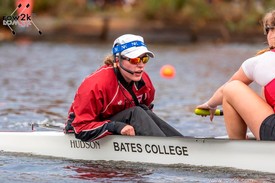In the Driver's Seat, with Jack DiGiovanni
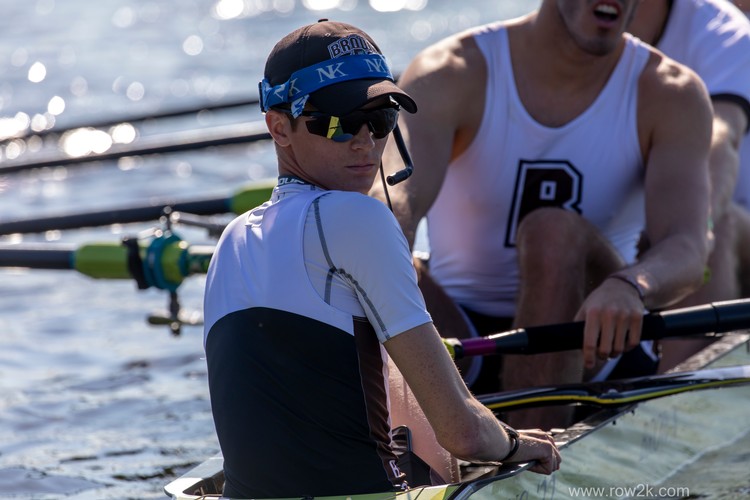
(Ed. Note: this interview dates to 2022, when DiGiovanni made his first U23 team; he made the U23 BM8+ again in 2023, racing in Plovdiv.)
Next up In The Driver's Seat—-row2k’s column that sits down with the folks in our sport who keep the shells straight and add that extra something to the teamwork of a crew—-is coxswain Jack DiGiovanni.
Jack, who was just named to the 2022 U23 Team in the Men's Eight, coxes at Brown during the school year, where he drove the V8 to an IRA Bronze in June. That medal was the first time Brown had been back on the IRA podium in eight years, and that bronze pairs well with the silver Jack and Bruno took at Men's Sprints in May.
Spring 2022 wound up being Jack's first actual racing season, after his freshman season in 2020 never happened and the gap year he took in 2020-21.
Jack and his crew leave today for the U23 racing in Varese, Italy, next week. The U23 Eight heats are set for Tuesday, July 26th.
Let's hop In The Driver's Seat with Jack:
row2k - What are your top three essentials for being ready on Race Day?
Jack DiGiovanni - Being fueled, having a plan, and being calm.
First, it is so important to take care of yourself and your body so you can bring 100% on race day. This means healthy eating and hydration leading into, and on, race day. For me, eating something small (fruit, a bar, nuts, etc.) when I wake up and then again about 20-30 minutes before launching works well. When it is hot out, drinking water and electrolytes throughout the day is important. Treat yourself and your body like an athlete and you will be prepared for competition.

Second is having a plan. This goes for the race piece as well as the lead-up to launching and the warm up. In order to be prepared for race day, you want to spend the weeks leading into the regatta ironing out exactly how you and your crew want to warm up, and then practice this in training. Same goes for the race plan: you do not want to show up on race day and be trying new things or calls. Everything you do in racing should come from your training and be practiced before you arrive. Use your practices at home to test out new calls and variations in your warm up that can ultimately be used on race day.
With launching, being familiar with the regatta site, how long it will take to get to the start, and what the warm up area looks like will help you run an efficient pre-race without having your crew waiting around or being late to the line. Do some research on where you are racing. For me, this comes with practice, and you can time yourself in practice and see how long it takes to run your warm up. Ultimately, you want to show up on race day and just be in a routine, operating normally.
Third is being calm. On race days, rowers (and coaches, too) will likely have some level of nervousness leading up to race time. In the coxswain seat, it is your job to stay collected and keep your crew calm as you progress through the day. How you carry yourself around your rowers is important. It is ok to be nervous yourself, but you want to show as much confidence and poise as possible before your race. Working on #2 (having a plan/routine) will give you stability and consistency, helping you stay calm on race day.
One last thing here: having fun with it and expressing how much you enjoy what you do is huge. Race day is a celebration of all of your hard work in practice, so enjoy the day and bring lots of good energy.

row2k - What are the three most important things for being a successful coxswain?
Jack DiGiovanni - Being a good listener, managing personalities, and being confident.
Listening is huge when you are a leader. You are working with 4 or 8 other people in your boat, and they all have ideas, opinions, and experiences that you can use to make the boat go faster. When I got to Brown I realized that I did not have all the answers, and there were many people on my team that were older and more experienced than me. Listening to them, taking advice from them, and being open to leadership from others in the boat can make both you and your crew rise to the next level.
Second is managing personalities. This is how my coach at Brown describes the role of the coxswain. The ability to read situations and work with others who may have a different approach is super important to your success. There can be many emotions, personalities, and reactions flying around in a crew--all things you are responsible for managing and even harnessing to your advantage. Being able to accommodate that, being willing to hear your teammates out, and then understanding what they need to hear or have is essential. This comes with time, being part of a team/crew, and listening.
Third is being confident. I think this is a classic one for sure. Rowers (and people in general) crave leadership, especially in athletic/performance scenarios. If you can be confident in your words, calls, and decisions, you will be more respected and a better cox in general. I have been told before that it is better to be decisive and fail confidently than it is to be timid or indecisive and find mild success. Back yourself and your experience, and don’t be afraid to make a mistake--these are mostly forgotten within a day or two. Confidence can also border on cockiness, so make sure to earn the respect of your crew, and be respectful towards teammates, fellow coxswains, and opponents.

row2k - What is your favorite drill to run with your crews? Any tips on how to the drill well, for maximum effectiveness?
Jack DiGiovanni - I like to run pause drills with my crews: release, arms away, body over, and half track.
The drill is simple for the rowers, and its objective is simple, too: create unification in our movements, and have points in the recovery that we gather at and move through together. Translating the pausing work into continuous rowing by emphasizing synced-up movements and fluidity connects the drilling to our regular rowing. This can be accomplished with calls as well as mixing a series of pauses into a stretch of continuous rowing, and repeating as needed throughout a session to hone in on a certain part of the recovery sequence that needs some work.
I also like square rowing all 8 because it emphasizes the ends of the stroke, and helps a crew to stay 'held in' and 'pressed through' the extraction of the blade, and gets everyone to the correct height off of the release. I do this type of drilling when we need to work on stability and the ends of the stroke, and again, mixing it into a continuous stretch of rowing can help the crew focus up and continue to improve technically.
row2k - What's some of the best coaching advice you've received about your coxing?
Jack DiGiovanni - Something that has proven so important to my development as a coxswain is surrounding myself with coaches and other coxswains who have more experience than me and learning from them.
Almost everything I have learned about being a good coxswain has come from other coxswains who have been in my shoes, as well as fantastic coaches. Starting with one of my first coaches in high school (Julia Evans), to my Brown coaches (Paul Cooke, Rufus Biggs, Scott Cockle, and Graham Willoughby) and my national team coaches (Jesse Foglia and Pat LePage), I have gotten lots of feedback and advice. Whether it is yelling more, yelling less, being more decisive, how to call a middle move, or how to operate in different contexts, there is so much advice and small snippets of information you can take from coaches and use. If you just listen with intention, it is all there.
Coxswains who have been where I am are also very helpful and give great advice. Building relationships with these people can be really helpful. I was lucky to meet Sydney Edwards, the 2021 U23 M8+ coxswain, at U23 Camp last year, and have kept in touch with her since. She has been someone I can reach out to anytime with a question or ask for advice, and she will always be there to help me out. Surround yourself with people who can give you advice and who have walked the path that you want to walk.
I guess the takeaways here are: listen and you will find advice and meaning in your coach’s words; and create a network of people who, as more experienced coxswains and rowers, are capable of giving you advice that you can lean into for help.
One piece of advice that does stand out to me came from one of my coaches at Brown, Scott. He talked to me about being the rock of the crew: not phased by anything, always calm and consistent. Coxswains don’t have the luxury of showing any nerves or doubts, but instead get to be strong and confident in stressful environments. Since that came from someone who is a world champion coxswain himself, I took Scott's advice really seriously. I, like many, can get nervous and have doubts about the boat, my calls, etc. The ability to rise above that and be confident and calm--someone the guys can trust in high pressure situations--was something Scott described as necessary for success. This advice gave me the urgency to become that rock for the boat.

row2k - Can you tell us anything about how you learned you learned to make motivating calls?
Jack DiGiovanni - I think there are two key things that have helped me understand motivation and develop motivating calls.
First, putting myself in situations where I am physically maxed out and there is an end goal has been major. This has helped me be able to empathize with what my rowers are going through during a max effort piece (not fully, but somewhat), and to understand better what they would want to hear and what will make them feel even more motivated. To do this, I run or bike most days of the week, and have trained for half marathon and marathon races, giving me a clear date where I will execute a race. I think about what I say to myself in those tough training and racing situations, and many times, the words I use to motivate myself work quite well with my crew. As a cox, you are not exerting yourself in the same way as your rowers during practice, so finding time outside of the boat to do something athletic can really help you relate to your rowers!
The second thing is diving deep and learning about your crew: why they do what they do and what makes each individual tick. At a high level, everyone wants to win a big race, but each athlete may have slightly different things they want to accomplish in a season, and at varying levels. Talking to your crew, asking questions, and listening has helped me learn a lot about my teammates, and I aim to translate this knowledge into the work we do in racing.
As much as you can try to learn motivation, it also comes down to in-the-moment decision making and calls that ultimately make the difference. Those don’t always happen super often, but being able to keep your mind clear during a race and stay in the moment can allow you to make meaningful calls more often.
row2k - Best race/practice you've ever had?
Jack DiGiovanni - Best race was definitely the Grand Final of the Varsity 8 at the IRA this year.
To be part of a crew that continuously improved and found speed throughout the season, came up short against several opponents, and ultimately made the podium at the IRA was such a special process. To be in that moment and see so much work and such a physically and mentally taxing season culminate in a great finish (and a medal) was an amazing moment. We executed our race plan just how we wanted and it showed in the results--can’t ask for too much more than that.

It’s important to recognize that this “best race” was the result of a major effort over many months from so many people. Looking back across the season, there were many frustrating sessions, breakthrough days, failures and successes along the way. That rollercoaster made the final race of the 2022 IRA campaign so special. Each day, especially the tough ones, built me and my teammates up to create a medal-worthy performance when it mattered most, and I could look back on those days and realize how every single one prepared me for that most important race.
row2k - Worst race/practice you've ever had?
Jack DiGiovanni - I don’t think I can point to a worst race or practice at any point in my career.
I firmly believe that every moment and day in the boat is an opportunity to learn. Failing and making mistakes in training and racing is where I learn the most about what changes I need to make in order to move forward in a positive direction. Even the toughest and most personally disappointing sessions would not fall under the “worst” category for me. Regardless of how they went, important lessons are being learned and if you can stay excited about that and stay in the process, you will continue to improve.
Thanks for riding along with Jack -- you will be able to follow him and the rest of the USA's U23 and U19 team all next week here on row2k.
This column is open to all "drivers" out there, so if you are an experienced coxswain at any level--from juniors to masters--and would be willing to invite row2k to join you in your ride, just contact us here. We’d love to hear from you about what you see from the Driver's Seat.
If you enjoy and rely on row2k, we need your help to be able to keep doing all this. Though row2k sometimes looks like a big, outside-funded operation, it mainly runs on enthusiasm and grit. Help us keep it coming, thank you! Learn more.
Comments | Log in to comment |
There are no Comments yet
| |
- Bont Rowing
- Calm Waters Rowing
- Concept 2
- Craftsbury Sculling
- The Crew Classic
- CrewLAB
- Croker
- Dad Vail Regatta
- Durham Boat Co.
- Empacher
- Faster Masters
- Filippi
- Fluidesign
- h2row.net
- HUDSON
- Live2Row Studios
- Nielsen-Kellerman
- Oak Ridge RA
- Peinert Boat Works
- Pocock Racing Shells
- Race1 USA
- Rockland Rowing Masters Regatta
- RowKraft
- Rubini Jewelers
- Vespoli USA
- WinTech Racing
- Bont Rowing
- Calm Waters Rowing
- Concept 2
- Craftsbury Sculling
- The Crew Classic
- CrewLAB
- Croker
- Dad Vail Regatta
- Durham Boat Co.
- Empacher
- Faster Masters
- Filippi
- Fluidesign
- h2row.net
- HUDSON
- Live2Row Studios
- Nielsen-Kellerman
- Oak Ridge RA
- Peinert Boat Works
- Pocock Racing Shells
- Race1 USA
- Rockland Rowing Masters Regatta
- RowKraft
- Rubini Jewelers
- Vespoli USA
- WinTech Racing




